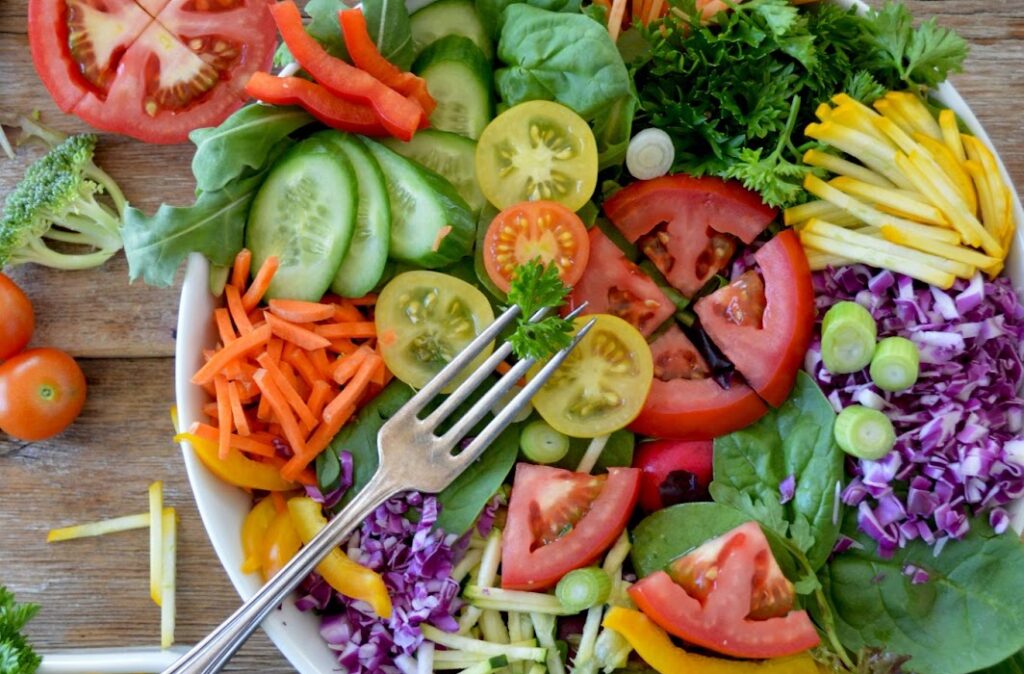According to the Centers for Disease Control and Prevention (CDC), over 73% of adults over the age of 20 are overweight or obese in the United States. Yes we are in a good place to be able to have available medicines like Semaglutide, Wegovy, Ozempic, Mounjaro and Tirzepatide to help combat obesity.
Obesity is correlated with an increase in risk for many serious diseases and health conditions. Some diseases including but not limited to are heart disease, stroke, diabetes, chronic pain, Alzheimer’s disease, cancer, and poor mental health.
Many people try to lose weight by simply eating less or not eating at all. Science has taught us this method is not sustainable for most people. A good alternative is to consider consuming more low calorie, nutritious foods that will give satiety and help with weight management.
Adding more nutritious, low calorie foods to your diet helps meet your nutritional needs while reducing your calorie intake.
Vegetables and fruits are beneficial and have been shown to reduce the risk for those aforementioned chronic diseases. Good nutrition also helps with good skin health, wound healing, energy, sleep and mental health to name a few.
As per Jenna Sager, Registered dietitian, MS, all of these foods have less than 40 calories per serving.
Coffee is rich in polyphenols, such as chlorogenic acid and caffeic acid. Research shows that coffee is linked to many health benefits. A 2021 review and research have found that coffee may have positive protective effects on the brain.
Black coffee is essentially calorie-free, with just 2 calories per 100 grams (g), or about 5 calories per cup. The catecholamines released from coffee consumption may actually expedite fat burning, so you can consider black coffee a zero calorie beverage.
Cabbage is a cruciferous vegetable that comes in various forms and colors. There is purple cabbage, green cabbage, and napa cabbage.
It contains only 25 calories per 100 g but is rich in folate, vitamin K, and vitamin C. Purple cabbage is rich in a phytochemical called anthocyanin, which has shown many health benefits.
Mustard is a very low calorie condiment that you can use to add flavor to food.
A typical serving of 1 teaspoon (6 g) contains 3.66 calories on average, depending on which mustard you choose.
You can try using it as a condiment for sandwiches, in salad dressings, or as a replacement for mayonnaise in tuna salad.
Pickles are a great low calorie snack. You may also enjoy them sliced up as a topping for sandwiches.
There are only 12 calories per 100 g of pickles. Fermented pickles are also rich in probiotics, which are the beneficial bacteria in your gut.
Peppers come in various forms and colors, such as bell peppers, shishitos, chili peppers, poblanos, and jalapenos. They are all low in calories, and each type has different health benefits.
Red bell peppers contain just 27 calories per 100 g and are rich in vitamin C and lycopene.
Grapefruit is a citrus fruit that you can enjoy on its own. You can also eat it on top of salads or yogurt, for example. It contains 37 calories in a 100 g serving yet is high in vitamin C and phytochemicals, which are beneficial plant compounds.
Of note, Grapefruit is a common contraindication for certain medications, like statins. Be sure to check with your doctor first to ensure it is safe for you to eat.
Celery has a high water content, making it low in calories. It is also high in fiber.
There are only 14 calories in 100 g of celery. You can chop it up in a salad for some added crunch. You can also top it with some nut butter for a snack or add it to a chicken salad.
Cucumbers are predominantly water, so they are very low in calories. You can try them as a hydrating snack or add them to salads and protein-rich dishes.
There are only 15 calories in 100 g of cucumbers. The peel is rich in silica, which is an important component of your hair, skin, and nails.
Kale is an exceptionally nutritious dark leafy green vegetable that is low in calories. It contains just 35 calories per 100 g serving. Kale is very high in vitamins and minerals such as:
The predominant carotenoids in kale are lutein and zeaxanthin, which concentrate in the macula of the retina. They may help protect your eyesight.
You can have kale in salads, smoothies, or added to many savory dishes.
Asparagus is a flowering vegetable that comes in green, white, and purple varieties. Asparagus contains only 20 calories per 100 g.
It is a good source of vitamin E, vitamin C, vitamin K, and glutathione.
Asparagus contains various phytochemicals. It is notably rich in quercetin and kaempferol, which are flavonoids that may be beneficial to heart health.
Arugula, also known as “rocket,” is a cruciferous vegetable with a peppery flavor. It contains 25 calories per 100 g serving.
Arugula is rich in vitamin K as well as beneficial plant compounds, including indoles and isothiocyanates.
Collard greens are dark leafy green vegetables with a high nutritional profile despite their low calorie content. There are only 32 calories in 100 g of collard greens, yet they are rich in calcium, vitamin K, vitamin C, and folate.
You can try collard greens as a wrap replacement, in salads, or added to savory vegetable dishes.
Broccoli is a cruciferous vegetable that is very nutritious and low in calories. Cruciferous vegetables are rich in beneficial plant compounds called isothiocyanates. Among all cruciferous vegetables, broccoli and broccoli sprouts contain the highest amount of these compounds. Isothiocyanates have been shown to have a wide range of health benefits.
Broccoli is also high in vitamin C, folate, vitamin K, potassium, fiber, and iron. It contains just 34 calories per 100 g.
Heat destroys the vitamin C, folate, and enzyme needed to convert the isothiocyanates into their active forms. Therefore, try including raw, fresh broccoli in your diet to maximize the benefits.
Cauliflower is an incredibly versatile cruciferous vegetable that you can have in various ways. It is highly nutritious and very low in calories and carbohydrates, making it an excellent swap for many dishes. Cauliflower also comes in different colors, including purple, white, and orange. Each color is caused by different phytochemicals.
The calorie content in cauliflower is just 25 calories per 100 g. It is high in vitamin B6, vitamin C, fiber, biotin, and folate.
Spinach is a dark leafy green with more of a neutral flavor.
There are just 23 calories in 100 g of spinach. It is high in magnesium, potassium, vitamin K, folate, and beta carotene.
Spinach is also rich in the carotenoids lutein and zeaxanthin, which may help protect eyesight.
Beet greens have high concentrations of nitrates, which help to lower blood pressure.
They are another low calorie, highly nutritious dark leafy green. Beet greens contain 22 calories in a 100 g serving. Furthermore, they are high in vitamins and minerals such as:
You can try adding them to stir-fried meals, smoothies, or salads.
Lemons are citrus fruit rich in bioflavonoids, such as limonins. Limonins are found mostly in the juice, but the pith is also concentrated in bioflavonoids.
There are 29 calories in 100 g of lemon. One average lemon, which is about 58 g, contains an estimated 50% of your daily value for vitamin C. Vitamin C protects against free radical damage and plays an important role in collagen formation.
You can try adding lemon to smoothies, use them as a marinade for fish, or as a salad dressing component.
Zucchini is another low calorie, nutritious fruit with high versatility due to its neutral flavor. There are just 17 calories in 100 g of zucchini. It is also a good source of magnesium, potassium, vitamin C, and folate.
You can try preparing zucchini in a number of ways. You can spiralize them to emulate noodles or add them to smoothies. They can add volume to any dish without additional calories.
Shiitake mushrooms are the reproductive bodies of fungi. They are low in calories, with just 34 calories per 100 g.
Shiitake mushrooms are also rich in beta-glucans, which are a prebiotic that may help lower cholesterol. They also have several other health benefits. Additionally, they are a good source of selenium, B vitamins, amino acids, and vitamin D2.
Watercress is a dark green leafy vegetable that is highly nutritious and low in calories. It is also a member of the cruciferous family, so it boasts beneficial plant compounds that are exclusively found in cruciferous vegetables.
There are just 11 calories in 100 g of watercress. It is also notably high in vitamin K, vitamin C, folate, potassium, and calcium.
Summary
Many people try to lose weight by eating less. Not only is this unsustainable, but you may also miss the adequate nutrients you need for optimal functioning, weight loss, and chronic disease prevention. Prioritizing nutritious foods that are lower in calories may be a healthier, more sustainable approach for long-term weight management and better health.
If you have been struggling to maintain a moderate body weight, you may want to try including more of these foods with lower calories in your diet. These foods along with the newer medications such as Wegovy, Ozempic, Semaglutide, Mounjaro and Tirzepatide will be very beneficial and effective for sustainable weight loss. Contact MedGalore Aesthetics & Wellness for a consultation or Book an appointment today for a customized weight loss plan. A weight loss plan that is affordable and sustainable. Or contact your doctor or a licensed nutrition professional for more individualized advice on diet and body mass reduction.
THIS TOOL DOES NOT PROVIDE MEDICAL ADVICE. It is intended for informational purposes only. It is not a substitute for professional medical advice, diagnosis or treatment. Never ignore professional medical advice in seeking treatment because of something you have read on the site. If you think you may have a medical emergency, immediately call your doctor or dial 911.
 LaTondra Barker, DMSc, PA-C
LaTondra Barker, DMSc, PA-C
LaTondra Barker PA-C of MedGalore Aesthetics & Wellness is our lead PA who has the goal of empowering others through passion and excellence. LaTondra Barker is a board certified PA with over 27 years clinical experience who utilizes a personalized and customized approach who will listen to your concerns. She will advocate for you and help you reach your goals.










HEALTHCARE DISCLAIMER:
MedGalore Aesthetics and Wellness uses customized medical-grade pharmaceuticals to help meet your needs. We utilize FDA approved and Some of our treatments can be considered off-label use as in many medications have been used as off-label use for many centuries, therefore are not FDA approved for a particular indication. We want to make
awareness and will require a signed consent prior to the pharmaceutical order being placed.
We Cannot Diagnose or treat Skin Cancers and Certain Suspicious Skin Moles or Lesions.
All health optimization treatments are voluntary in nature and are not medically necessary unless otherwise stated elsewhere.
The information, including but not limited to, text, graphics, images and other material contained on this website are for informational purposes only. The purpose of this website is to promote broad consumer understanding and knowledge of various health topics. It is not intended to be a substitute for professional medical advice, diagnosis or treatment. Always seek the advice of your physician or other qualified healthcare provider with any questions you may have regarding a medical condition or treatment and before undertaking a new health care regimen, and never disregard professional medical advice or delay in seeking it because of something you have read on this website.
Copyright © 2024 MedGalore Aesthetics & Wellness All rights reserved. ™